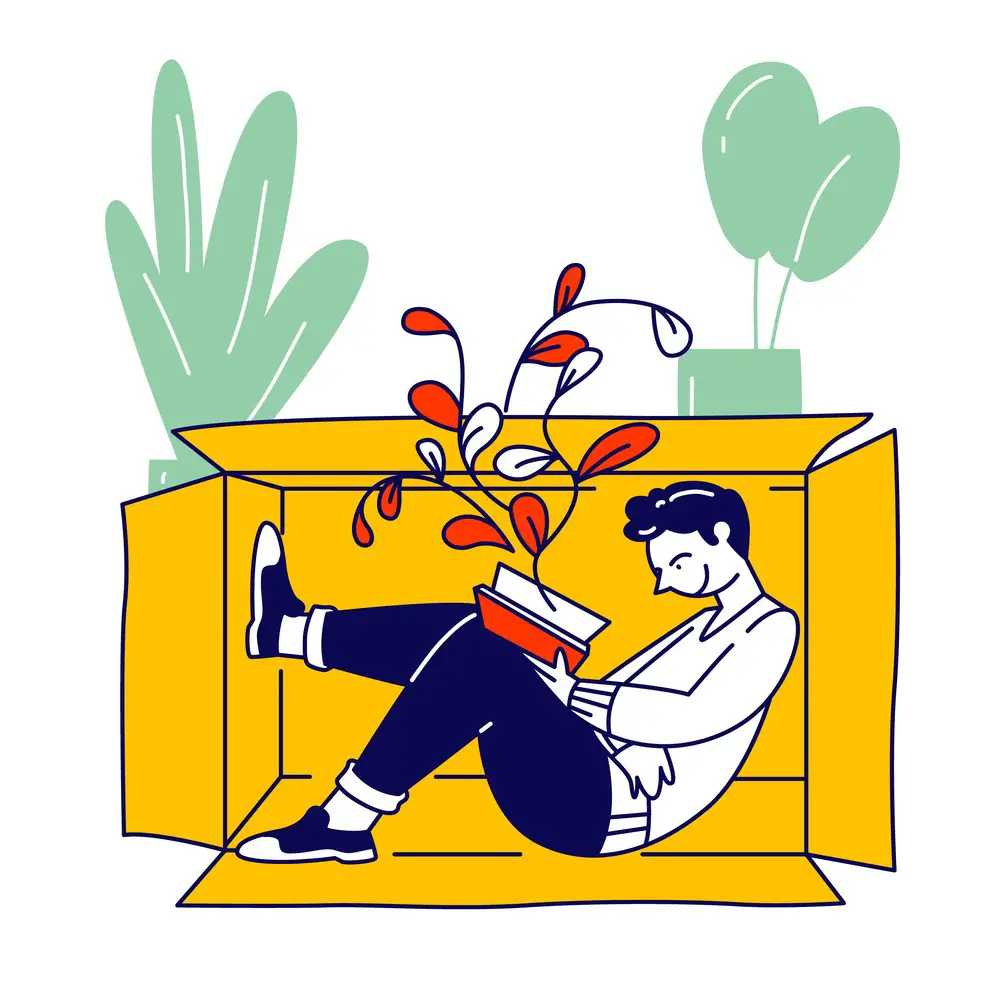As a BetterHelp affiliate, we receive compensation from BetterHelp if you purchase products or services through the links provided
Many people treat social anxiety and introversion as two sides of the same coin, but the two are more like two circles in a Venn diagram; they may share characteristics but take up space in different areas of mental health.
Comparing the two allows you to identify harmful traits and give yourself peace of mind with what might be expected.
In this article, we’ll point out some areas where the two overlap and how they still differ significantly in these areas.
Social Anxiety vs. Introversion: How We’ll Compare Them
While introversion and social anxiety interact on similar planes of belief, these are two characteristics distinguished by factors, such as:
- Their cause
- The effects of alone time
- Thoughts and behavior in social settings
- Methods for improvement
We’ll explore these differences in the following sections, pointing out how introversion and social anxiety differ and how they may be the same.

Causes of Social Anxiety Disorder and Introversion
The most immediate difference between social anxiety and introversion digs into the root of their cause.
Generally, social anxiety is one of the five significant types of anxiety disorders, while introversion is a personality trait. The two stem from entirely different causes, allowing them to exist in the same body but not meaning that they share origins.
Social Anxiety Disorder
Social anxiety refers to fear and/or apprehension regarding social interaction or performance situations. This fear is usually due to past social experiences, such as:
- Abuse
- Family conflict
- Traumatic events and conditions
- Social interactions
- Bullying
Genetics plays a part in how prone you may be to developing social anxiety, but it doesn’t guarantee the issue shows up. Controlled or overbearing environments and situations can worsen social anxiety, and you see this in children with “helicopter parents”.
The COVID19 pandemic and subsequent lockdowns are another real-world examples of how certain conditions can worsen social anxiety, even in those without a history.
Introversion

Introversion is a personality trait that doesn’t come as a side effect of any life events. It cannot be shaped by what happens in your life, and it often serves as the foundation for the rest of your personality, including:
- Hobbies and interests
- How you form and maintain relationships
- What you choose to involve yourself in
Your introversion may be influenced by certain environmental factors, such as how you were raised, but these still shape the characteristics within the boundaries of introversion.
Some evidence suggests introverts have a sensitivity to dopamine, furthering this point. Genetics often determines this sensitivity, and it separates many introverts from extroverts who seek dopamine as a reward.
How They Compare
When looking at the two head-on, it’s evident that social anxiety is caused by other factors, while introversion simply exists and supports additional factors in your personality.
Becoming a socially anxious introvert is possible, but this only means you have both causes. The introvert in you comes from a predisposition to introverted traits, and your social anxiety stems from your social experiences.
If you are both an introvert and a socially anxious person, it’s difficult to determine the root of your anxiety. Your introversion may set the stage, but your anxiety is always rooted in specific instances that cultivate anxious feelings, not simple introversion.
The Effects of Alone Time

Another significant difference between social anxiety and introversion is how they respond to alone time.
Those with social anxiety may find temporary relief from alone time, but it also creates an opportunity to worsen their anxious thoughts. Introverts recharge when they have time alone. It’s not negotiable, but it doesn’t worsen their introversion or negatively impact them.
Social Anxiety
Socially anxious people spend plenty of time alone, but it’s rarely their choice. Those with social anxiety usually isolate themselves because they fear social interactions. This then leads to feelings of contempt, much like they assumed others at the events would feel from their attendance, and they spiral.
Someone with social anxiety who attends the event will often reflect on it in their alone time. Spending time alone might start as a reprieve from the stress of the social event, but it shuts them off with their thoughts.
Those who have social anxiety and find themselves alone may feel the same paranoia and fear they felt before and during a social event; there is no resolution.
Introversion
Introverts need time alone to settle their everyday anxiety, and they welcome it with grace. Your introverts recharge by carving out the time they can spend in isolation and usually have hobbies they do on their own.
For introverts, spending time alone is simply how they enjoy their life. They get their energy from within and feel comfortable in minimally stimulating environments. Their social energy refills as they take a step back to do things like:
- Read
- Make art
- Daydream
- Get lost in their thoughts
They don’t experience anxiety when left to their own devices and can spend time alone without worsening their condition.
How They Compare
When you compare the two, socially anxious people respond poorly to their time spent alone, while introverts thrive on it.
This can cause people with social anxiety to depend too much on certain people, and their codependence often worsens their symptoms. The more dependent they are on familiar people, the harder it is to spend time alone.
Introverts seek time alone regularly. It doesn’t make them any more or less likely to interact with others, and they are no more or less likely to become codependent. This also means that introverts cannot get by without alone time; their social battery will not refill properly, which may lead to irritability or anxious behavior.
Thoughts and Behaviors Regarding Social Interaction
While socially anxious people and introverts may not be as excited about social interactions as extroverts, their thoughts about the events differ.
A person with social anxiety often has physical and mental responses to the idea of a social or performance situation. In contrast, an introvert simply has their opinions with no responses or symptoms that guide their processes.
Social Anxiety
Social anxiety, also known as social phobia, is a mental health condition that carries common symptoms and behaviors. These include:
- Significant nervousness, disproportionate to the social event
- Upset stomach
- Significant fear of humiliation, embarrassment, or interacting with strangers
- Trembling
- Inability to make eye contact
These often cause an individual to avoid situations or even cancel plans, even if they might benefit them. Their mental illness holds enough weight to convince them that avoidance is better than what they might gain.
Those with social anxiety usually worry about being negatively evaluated by strangers and their friends. This makes it more difficult for them to interact with unfamiliar people, but it can also harm their relationship with close friends unless they learn to communicate.
Introversion
Introverts may not prioritize social events, but this doesn’t stop them from getting out. They usually keep their social circle small, but they won’t feel disproportionately anxious when meeting new people.
They also follow through on connections they recognize meaning in. This means that they won’t automatically dismiss a new connection, and they don’t construct a hypothetical situation that portrays their demise.
Introverts may even enjoy social situations in the right context, and an extreme form of anxiety doesn’t inhibit their social skills.
How They Compare
The most significant differences between social anxiety and introversion revolve around one’s feelings and responses to social events. This depends on the level of fear someone feels surrounding social interactions.
Someone with social anxiety experiences high fear before, during, and after an event. This goes beyond just shyness, and it makes them overly self-conscious.
A socially anxious person feels, regardless of how safe they are in the situation. These feelings fuel their decisions and may manifest in physical ways.
Introverts remain in control of social situations. They still need alone time to recharge their social battery, but their fear doesn’t prevent them from hanging out with friends or enjoying an activity.
Methods of Improvement
The first difference when comparing the improvement methods is that social anxiety is a state from which improvement is desired, while introversion is neutral. It’s not something you can change, but it doesn’t cause harm.
You can take action in both situations to change certain behaviors, but the degrees of intervention and the need to reach out is not the same.
Social Anxiety
Because social anxiety interferes with daily life, you want to combat the condition. Without active intervention, social anxiety often:
- Gets worse, leading to isolation and depression
- Eats up your time and mental energy by feeling anxious about situations and others’ opinions of you
- Keeps you from daily interaction (eventually necessary activities, such as work or shopping)
- Develops into debilitating fear (i.e. agoraphobia)
- Causes someone to drink alcohol or do drugs to manage their emotions
Mild cases may get by with simple practices, but most cases need the help of a mental health professional to combat the anxiety. Through therapy, the individual learns what to do, then they feel nervous. Social situations become less daunting as they manage worry in more productive ways, and mental health issues lessen the more action someone takes against them.
Introversion
An Introvert doesn’t need any intervention to combat their behavior. They may want to change certain aspects of their personality, but these are usually minor changes and habits that don’t harm their life.
An introvert can also experience social anxiety, which is when you’ll see them take more significant steps to change behavior. It’s mistakenly thought that introversion is a negative behavior and that introverts need to change so they don’t feel anxious.
How They Compare
Distinguishing between the usual feelings of anxiety and the paralyzing fear of social situations is essential when separating harmful social anxiety and healthy introversion; the two require different approaches.
While you can improve the situation for the socially anxious individual, there’s nothing you need to improve for the introvert.
The Breakdown
Social anxiety and introversion may exist in the same individual, but they come from different situations and affect daily life differently.
| Social Anxiety | Introversion | |
| Cause | Genetics (to a degree); social interaction; abuse; bullying; family conflict | Genetics; dopamine sensitivity; environmental factors (to a degree) such as parenting |
| Impacts of Alone time | Temporary relief; may devolve into negative tendencies | Recharge social battery |
| Thoughts and Behavior Regarding Social Interactions | Fear and avoid social interactions; do not pursue new connections | Don’t mind social interactions they’re interested in; build connections they find intriguing |
| Methods for Improvement | Often worsens and leads to isolation, loneliness, and/or depression; will not improve without the help of a mental health professional; need skills and guidance to navigate and manage | Does not require professional intervention; not necessarily something you can change; may develop certain skills to apply to social situations, but will not change how you recharge |
Final Thoughts
If there’s one thing to take away from this, understand that social anxiety is a treatable condition, whereas introversion is a personality trait.
There’s nothing wrong with being an introvert, and you should learn where the line is between normal introversion and the harmful effects of social anxiety. The two may share traits, but people with social anxiety need and deserve the peace of approaching social situations without fear.
- 7 Ideas to Help You Relax and Unwind on a Family Vacation - April 27, 2025
- How Having Cybersecurity Protection Helps You Relax - April 25, 2025
- 8 Reasons Why Spending Time Outside Calms You Down - April 25, 2025
This site contains affiliate links to products. We will receive a commission for purchases made through these links.



